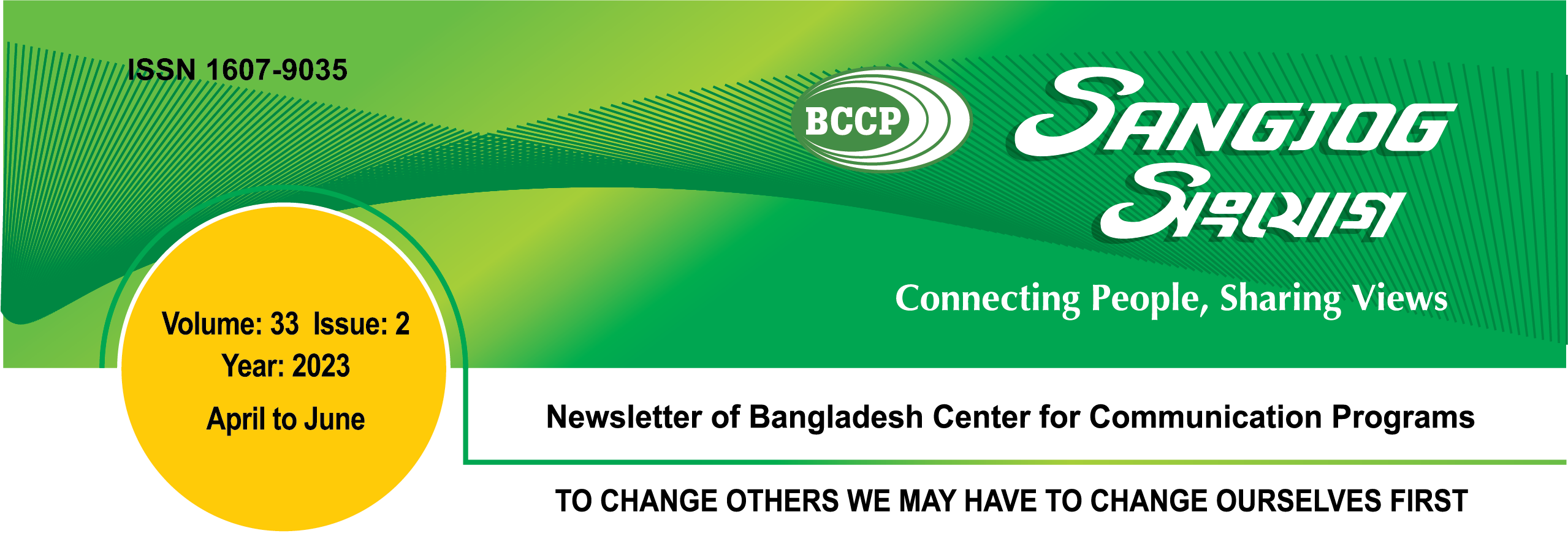
Mrs. Gule Afruz Mahbub
selected as the Acting President of the
Executive Board of BCCP
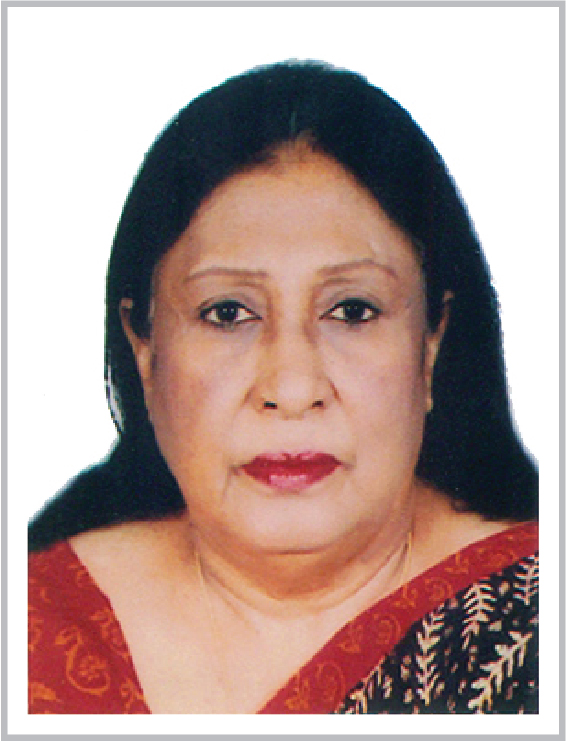 Renowned reproductive health & family planning, gender, women empowerment and social development specialist Mrs. Gule Afruz Mahbub has been selected as the Acting President of the Executive Board of the Bangladesh Center for Communication Programs (BCCP). With the sad demise of the former President of the Executive Board Dr. A. Majeed Khan on April 26, 2023, Mrs. Mahbub was selected as the Acting President of the Executive Board unanimously in an emergency meeting of the Board held on May 06, 2023. Previously, she had been playing role as a Member of the Board since 2007. Earlier, she was the President of the Board of Trustees of UN Institute of Training and Research on Advancement of Women (INSTRAW).
Renowned reproductive health & family planning, gender, women empowerment and social development specialist Mrs. Gule Afruz Mahbub has been selected as the Acting President of the Executive Board of the Bangladesh Center for Communication Programs (BCCP). With the sad demise of the former President of the Executive Board Dr. A. Majeed Khan on April 26, 2023, Mrs. Mahbub was selected as the Acting President of the Executive Board unanimously in an emergency meeting of the Board held on May 06, 2023. Previously, she had been playing role as a Member of the Board since 2007. Earlier, she was the President of the Board of Trustees of UN Institute of Training and Research on Advancement of Women (INSTRAW).
During her long career, she held different senior positions in various national and international organizations. She made remarkable contributions as Joint Secretary under different Ministries including the Ministry of Women and Children’s Affairs; the Economic Relations Division of the Ministry of Finance; the Rural Development & Cooperatives Division of the Ministry of Local Government, Rural Development & Cooperatives and the Bangladesh Small and Cottage Industries Corporation. She also held the position of Director in a number of Government departments including the Directorate of Women’s Affairs, Directorate of Family Planning etc. Mrs. Mahbub has rich experience of working with different international agencies in different senior positions. She was the Monitoring & Evaluation Specialist of the Global Fund, Dhaka, Bangladesh; Senior Adviser, Program Support Unit, Canadian International Development Agency (CIDA); Program Coordinator, UNIFEM, Afganistan and Bangladesh; Senior Adviser, Partners in Population and Development (PPD); Interim Country Representative, the Pathfinder Fund, Dhaka, Bangladesh; etc. In addition, Mrs. Mahbub successfully completed a number of international assignments to different countries.
In her academic background, Mrs. Mahbub obtained her Masters degree in Social Welfare from Dhaka University. Also, she has a Masters degree in Public Health from the University of California, Berkeley, USA. In addition, she has successfully completed a number of professional trainings from different well-recognized institutes at different countries.
Pursuing her thrust to contribute to social development, Mrs. Mahbub kept engaged to raise her voice to promote different social causes by affiliating with a number of forums. She has membership and professional affiliation with more than six reputed organizations.

Value for Money Thru Transparency in Public Procurement
e-GP - an effective system for
building Smart Bangladesh
Golam Shahnee
Copywriter, Editor & Press Relations Specialist
DIMAPPP, BCCP
e-GP (Electronic Government Procurement) – a complete digitized system of public procurement, has tremendously accelerated Bangladesh’s development activities for its unique features of accomplishing procurement related issues speedily and easily by maintaining transparency and accountability for ensuring value for money.
The e-GP system launched by the Prime Minister Sheikh Hasina in June 02, 2011 as part of Digital Bangladesh vision, has shown its wonderful effectiveness during the two-year long Covid-19 epidemic period since 2020 when the country like the entire globe saw a complete halt in lockdown.
Riding on this digital system, the government was able to successfully conduct development activities as the public procurement was fully operative for being automated through e-GP. This has now become a major and effective tool for the government for achieving its Smart Bangladesh vision by 2041.
For a strong drive by the Central Procurement Technical Unit (CPTU) under the Implementation Monitoring Evaluation Division (IMED) of the Ministry of Planning, e-GP has been very well-equipped in the course of an age so it is now compatible for conducting all procurement.
The system is supporting the government through promotion of public procurement-related acts, rules, and guidelines. As it is a digitized method, it’s implementation was a big challenge for the government due to uncertainty that the tenderers and other relevant stakeholders might not accept it.
But through relentless efforts of the CPTU under the IMED of the Ministry of Planning, e-GP has become very popular among all stakeholders as an effective method for tendering process for being transparent, fast, and smooth tendering system.
For its effective and modern facilities, the e-GP system has reduced time for preparing tenders in a shorter time by fulfilling its purpose to make the procurement procedure easier and cost-effective through accountable and transparent manner and ensured appropriate use of public money and accelerate country’s sustainable development.
Concerned stakeholders in various workshops on e-GP and public procurement have appreciated e-GP saying that its appropriate implementation will bring equality in works and ensure inclusive participation of all concerned in the tendering system.
e-GP Makes Major Progress: Plays Vital Role in Development
Some 80 percent of the budget of development projects are spent for procurement which is now completed through the e-GP system to ensure transparency and accountability. A speedy and effective procurement system is crucial for ensuring comprehensive development of the country. This system is a part of digital Bangladesh and brought a significant change in the procurement system.
CPTU is vigorously working to include more organizations with the system. Till now, 1,422 organizations have been registered with the system. These organizations have more than 11,000 procuring entities, which is increasing day by day. So far, more than 1,03,000 tenderers have been registered with the e-GP system, and around 6.5 lakh tender notices were made through it. Among these, at least 4.0 lakh tender contracts have been completed using the e-GP system. Around 52 banks have been registered in the system.
Advancement of the System
The e-GP system is still advancing to become user-friendly and for its use in all types of procurement. The provision for inviting international tender for goods through e-GP, and automated chalan or AChalan, tenderers database, e-CMS or electronic contract management system and iBAS++ have been included in the system to make the tendering process more user-friendly.
Through iBAS++, payments of the e-GP system such as registration fee, registration renewal fee, tender document fee, tender security, performance security, etc. can be completed through 6,600 branches of banks.
In the past, the contract signing of a tendering was manual but now almost everything, from contract signing to completion report can be submitted though the online system through e-CMS. It requires no human interaction or office visiting. e-CMS system is still under test-run, but once it is completed, it will reduce the hassles in bill payment as well.
A helpdesk has been placed at CPTU to provide technical supports to the users for 24/7 from anywhere in the country. Besides, 10 other helpdesks have been placed in government organizations.
BCCP’s Pivotal Role in e-GP Implementation
The Central Procurement Technical Unit (CPTU) has been implementing Digitizing Implementation Monitoring and Public Procurement Project (DIMAPPP) under financial support from the World Bank from 2017 to 2022, which has been extended till December 2023 with additional financing to restructure strategic communication activities.
Bangladesh Center for Communication Programs (BCCP) has been assigned as the Communication Consultant of DIMAPPP of CPTU. The overall objective of the assignment is to strengthen and institutionalize the systems and functions of various forms of strategic and stakeholder engagement communication across the public procurement practices in Bangladesh and provide communication support for and around the formation of a new public procurement authority.
As part of the activities for the phase II, BCCP has already organized 04 (four) out of total 08 (eight) e-GP workshops, 04 (four) out of total 08 (eight) Government-Tenderers Workshop (GTF) workshops, 02 (two) out of 03 (three) Orientation Workshops for Journalists on e-GP and Public Procurement and completed major accomplishments till date.
In various workshops, CPTU officials have highly appreciated BCCP for its pioneering role and wonderful performance in creating awareness among tenderers and procuring entities organized by CPTU.

Members of social communication forum and tobacco control movement networks pledged on for consolidated effort expressed in an event hosted by BCCP
A high turn-out of the members of the Bangladesh Association for Social Communication (BASCOM) and the members of tobacco control movement networks convened on May 11, 2023 at BCCP to discuss and plan for consolidating their effort in sharing knowledge and experiences with communication professionals for advancing with an informed community to be responsive for social development issues.
Social communication network BASCOM envisioned with new hopes and aspirations
Members of the social communication network had convened under the umbrella of BASCOM, who are basically the alumni of the Advances in Strategic Communication course annually held in Bangladesh since 1994, in their re-union and general meeting event held at BCCP Multipurpose Hall. The members of BASCOM had attended event to carry on mission and vision of this platform by revitalizing the forum.
BASCOM’s function started with a one minute’s silence to pay tribute to Late Mr. Dr. A. Majeed Khan, the President of the Executive Board of BCCP who passed away on April 26, 2023 at the Evercare Hospital due to old age complications.
The formal session had two parts as; General Meeting and the re-union event. The general meeting came out with forming a 15-member Executive Committee who have been pledged to;
- Set a vision for carrying on BASCOM meeting demand of the current context of strategic communication perspective.
- Set a brand for BASCOM as an effective and credible forum in the social strategic communication field.
- Develop and establish a communication hub.
In the re-union part of the event, the member participants recalled the old days memory beginning from 1994 up to 2023 during when annual Advances in Strategic communication were held and stayed together for two-week’s time. However, they have expected to meet at regular intervals and envisaged to revitalize the BASCOM with the effort of new Executive Committee who will also make their initiatives to organize seminar and symposium on issues of current context.
Tobacco control movement network and alumnus of Leadership courses pledged for consolidate and reinforcing efforts
The reunion of the members of Bangladesh Tobacco Control Research Network and Leaders in Tobacco Control Alumni Association found participants with all enthusiasm to meet each other after a long time. Prof. Dr. Nawzia Yasmin, President, Bangladesh Tobacco Control Research Network and acting Vice Chancellor of the State University of Bangladesh welcomed the participants and urged them to work for the tobacco control especially for getting approval of the Tobacco Control Law Amendment which is currently under approval.
A PowerPoint presentation on the “Proposed Tobacco Control Law Amendment: Collective and Individual Efforts to Mitigate the Challenges was made by Mr. Md. Hasan Shahriar, Member, Leaders in Tobacco Control Alumni Association followed by an open discussion. The closing remarks were made by Brig. Gen (retd.) Afzalur Rahman, President, Leaders in Tobacco Control Alumni Association.
Mr. Mohammad Shahjahan, Director and CEO, BCCP made a concluding remark for both of the BASCOM and the members of tobacco control movement network and said that the members are having globally accepted communication tools and knowledges to bring it out for the benefit of our community. He urged upon the members of both the forums to work for giving voice to voiceless people. He also hoped that both of these forums will not only remember the past but also making efforts for building future. Finally, he thanked all the attendee members for their presence and reenergized in making efforts on social communication issues.
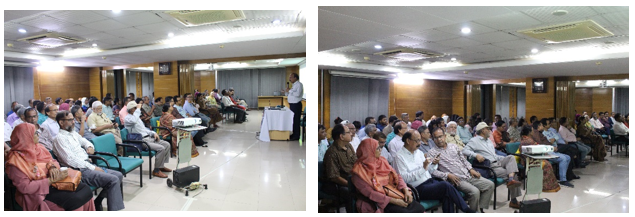
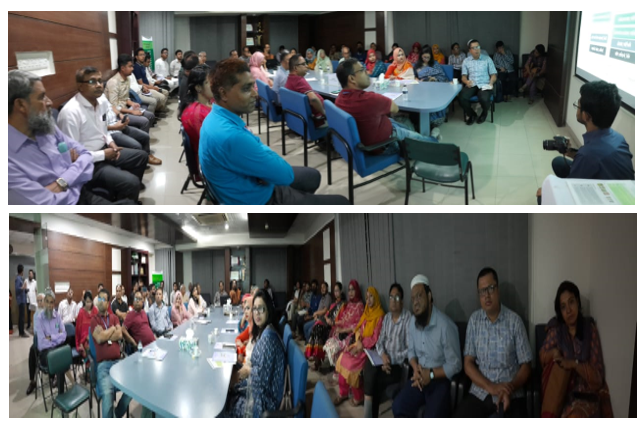
BCCP Continues to make its contribution for a climate resilience society
A relentless effort towards for creating an informed and enlightened society, BCCP will now work for planning, developing and implementation of a training program under the "Climate Informed Hospital Emergency Preparedness and Response Plan" for the health sector professional. This plan aims to ensure the continuity of essential services, coordinated hospital operations, clear communication, adaptation to increased demands, efficient use of scarce resources, and a safe environment for healthcare workers.
Under a WHO contract this program intervention have been planned to develop a manual and provide training to the medical doctors and hospital-based service providers to extend health services and support for health service seekers affected by climate change hazards.
As part of work progress an inception meeting between WHO and BCCP was held on May 31, 2023 at WHO Bangladesh HQ to plan out the step-wise implementation of the manual development and the training program. The meeting set out key milestones in course of the development and implementation of the training program as;
 * Formation of a Technical Working Group
* Formation of a Technical Working Group
* The training manual will be in the form of TOT which is to be followed on by the cascaded model of training
* TOT is to be provided at the divisional level
* The time frame for training manual development and TOT will be from May’23 to October’23.
It is expected that this training will create climate responsive service providers at the health service delivery sites and also profoundly create a base of health service provision for the people who are affected by the climate change hazards.
LGED confers the communication and awareness service to BCCP as emergency responses for the Rohingya people
The Bangladesh Center for Communication Programs (BCCP) has been awarded the Communication and Awareness Service (CAS) partnership for the Emergency Multi-Sector Rohingya Crisis Response Project (EMCRP). The Local Government and Engineering Department (LGED) has conferred BCCP with this crucial responsibility, extending the contract to continue for around one and half years. EMCRP, financed by the World Bank, aims to assist the Forcibly Displaced Myanmar Nationals (FDMN) and the host community in Cox's Bazar. LGED, in collaboration with DPHE and Ministry of Disaster Management and Relief (MoDMR), is implementing the project.
With prior success, under the preceding contract with LGED, in 20 Rohingya Camps and the host community of Ukhiya and Teknaf Upazila, BCCP is well-prepared to deliver communication and awareness services. Under this new contract, BCCP will focus on a two-way human-centered communication strategy, stakeholder consultations, training, awareness materials, consensus-building, and project result dissemination in both national and local news media.
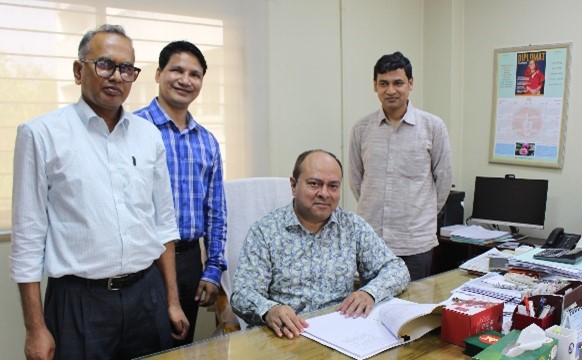 The partnership agreement was signed on March 28, 2023, at the Project Directors Office EMCRP LGED. Mr. Javed Karim, Project Director of EMCRP, LGED, and Mr. Mohammad Shahjahan, Director & CEO of BCCP, signed the contract agreement. The signing event was attended by Mr. Abu Hasib Mostafa Jamal, Team Leader of CAS for EMCRP, LGED, Deputy Director (Program) of BCCP, and other LGED officials.
The partnership agreement was signed on March 28, 2023, at the Project Directors Office EMCRP LGED. Mr. Javed Karim, Project Director of EMCRP, LGED, and Mr. Mohammad Shahjahan, Director & CEO of BCCP, signed the contract agreement. The signing event was attended by Mr. Abu Hasib Mostafa Jamal, Team Leader of CAS for EMCRP, LGED, Deputy Director (Program) of BCCP, and other LGED officials.
Establishing coordination with project stakeholders is of utmost importance for the team, as it ensures the smooth implementation and sustainability of the awareness activities at the field level. Recent visits to the office of the Refugee Relief and Repatriation Commissioner (RRC), Deputy Commissioner's (DC) Office and LGED Office in Cox's Bazar by the Team Leader Mr. Abu Hasib Mostafa Jamal along with Mr. Ridoanur Rahaman, the Deputy Team Leader facilitated the introduction of the project and submission of relevant documents. High-ranking officials from RRRC, DC Office and LGED Office Cox’s Bazar expressed support and cooperation. In Teknaf Upazila, a meeting organized by BCCP's EMCRP field office led by Social Awareness Specialist Ms. Aparajita Micheng and supported by Field officers Mr. Abu Horaira and Mr. Mofizur Rahoman on June 6, 2023, discussed various CAS activities, with valuable insights shared by the Upazila Engineer, Mr. Ariful Islam, who assured full cooperation.
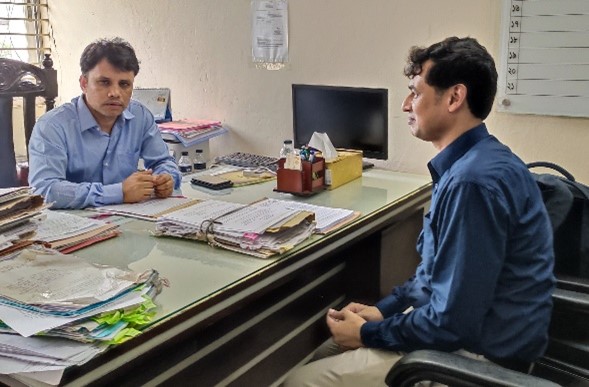
On the other hand, in Maheshkhali Upazila, a meeting was impeccably organized by BCCP's EMCRP field office, under the guidance of Mr. Md. Nesarul Islam Jewel, Awareness Specialist for Infrastructure, and Mr. Abu Huraira, Field Officer CAS for EMCRP, LGED/BCCP. The purpose of this meeting was to submit project documents to the Upazila Engineer of LGED and the UNO of Maheshkhali Upazila in Cox's Bazar. The primary objectives of the meeting encompassed initiating coordination and providing an initial introduction. The team was cordially received by the Upazila Engineer, LGED Mr. Sabuj Kumar Dey, who expressed his satisfaction upon listening that these collective awareness on infrastructure utilization endeavors with care will be facilitated by the CAS activities, would benefit the common populace of the local community. Subsequently, the team had the opportunity to meet with Mr. Yasin Shimul, the UNO of Maheskhali, in the presence of the LGED engineer. During this meeting, the LGED engineer apprised the UNO of the forthcoming activities while the field team briefly described the role of BCCP and the significance of CAS in the context of EMCRP and LGED. The UNO carefully examined the project documents and expressed his best wishes to this team.
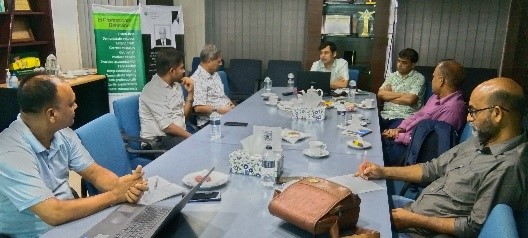 An introductory meeting of the central based CAS working group was held in Dhaka on June 7, 2023, consisting of specialized officials from EMCRP LGED and BCCP, focusing on technical inputs in CAS activities align with the communication strategy, and regular review meetings. The EMCRP CAS working group members include Senior Technical Specialists, Communication Specialists, Social Development Specialists, Environment Specialists, of LGED and representatives from BCCP. Discussions during the meeting centered around revising the Communication Strategy based on findings and recommendations from the endline survey report and project's completion report of the previously conducted CAS project by BCCP.
An introductory meeting of the central based CAS working group was held in Dhaka on June 7, 2023, consisting of specialized officials from EMCRP LGED and BCCP, focusing on technical inputs in CAS activities align with the communication strategy, and regular review meetings. The EMCRP CAS working group members include Senior Technical Specialists, Communication Specialists, Social Development Specialists, Environment Specialists, of LGED and representatives from BCCP. Discussions during the meeting centered around revising the Communication Strategy based on findings and recommendations from the endline survey report and project's completion report of the previously conducted CAS project by BCCP.
BCCP remains optimistic about the effective implementation of the World Bank financed EMCRP project of LGED. The project aims to raise awareness among FDMN and the host community on utilizing the social service delivery system effectively with care, engage stakeholders, outreach activities, promote social cohesion and disseminate the project results in national and local news media as well as social media. BCCP acknowledges the need for tailored approaches and emphasizes the program's objectives as a priority.
Anchor in the Sea: CAS Team of EMCRP, LGED; BCCP MAkes a Phenomenal Splash for New Office Launching at Cox's Bazar
 Like an anchor in the sea, this office serves as the committed wing for a series of transformative awareness activities. The Communication and Awareness Service (CAS) team members stand proudly as the captains and crew of the ‘communication awareness ship’, steering the course toward resounding success. BCCP appreciates this extraordinary display of ownership. During this tide of progress, BCCP has taken the opportunity to relocate the EMCRP field office to a more spacious and accommodating location in Ukhiya, Cox's Bazar. In a joyous celebration during an official visit for program orientation by Mr. Abu Hasib Mostafa Jamal, Deputy Director, BCCP, and Team Leader of this project; BCCP the office members radiated love and enthusiasm. The CAS team sets sail, equipped with knowledge, passion, and a solid drive to make a lasting impact on the lives they touch.
Like an anchor in the sea, this office serves as the committed wing for a series of transformative awareness activities. The Communication and Awareness Service (CAS) team members stand proudly as the captains and crew of the ‘communication awareness ship’, steering the course toward resounding success. BCCP appreciates this extraordinary display of ownership. During this tide of progress, BCCP has taken the opportunity to relocate the EMCRP field office to a more spacious and accommodating location in Ukhiya, Cox's Bazar. In a joyous celebration during an official visit for program orientation by Mr. Abu Hasib Mostafa Jamal, Deputy Director, BCCP, and Team Leader of this project; BCCP the office members radiated love and enthusiasm. The CAS team sets sail, equipped with knowledge, passion, and a solid drive to make a lasting impact on the lives they touch.
Recognizing the unique expertise of BCCP, LGED has extended their partnership for one and a half years, entrusting them with the pivotal responsibility of this crucial project. Backed by funding from the World Bank, EMCRP aims to deliver much-needed assistance to both the Forcibly Displaced Myanmar Nationals (FDMN) and the resilient host community in Cox's Bazar. In a collaborative effort alongside DPHE and the Ministry of Disaster Management and Relief (MoDMR), LGED is tirelessly implementing this groundbreaking project.
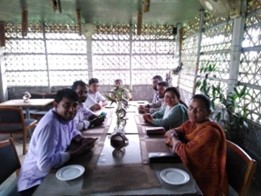 This new partnership BCCP undertakes to prioritize an all-encompassing, human-centered communication strategy, stakeholder consultations, training programs, community mobilization and outreach activities, impactful awareness materials, collaborative consensus-building efforts, and the extensive dissemination of project results through national and local media channels.
This new partnership BCCP undertakes to prioritize an all-encompassing, human-centered communication strategy, stakeholder consultations, training programs, community mobilization and outreach activities, impactful awareness materials, collaborative consensus-building efforts, and the extensive dissemination of project results through national and local media channels.
BCCP Showcased its Tobacco Control Activities in World No Tobacco Day-2023 Seminar
On 11th June 2023, a seminar was held at the Osmani Memorial Auditorium in Dhaka on the World No Tobacco Day 2023. The theme for this year's celebration was 'Grow food, not tobacco.' The event was organized by the National Tobacco Control Cell, Ministry of Health and Family Welfare. Mr. Zahid Malek, MP, the Minister of Health and Family Welfare graced the occasion as the Chief Guest while Dr. Md. Anwar Hossain Howladar, Secretary of the Ministry of Health and Family Welfare chaired the program.
Prof. Dr. Md. Habibe Millat, Member of Parliament, Dr. Md. Humayun Kabir, Secretary, Ministry of Railways, Dr. Bardan Jung Rana, WHO Representative to Bangladesh attended the program as Special Guests.
Md. Saidur Rahman, Additional Secretary of the Health Services Division, delivered the opening speech while Mr. Hossain Ali Khandaker, Coordinator of the National Tobacco Control Cell, presented a keynote paper at the program.
Health Minister in his speech reiterated the importance of making another amendment to the existing Smoking and Tobacco Products Usage (Control) (Amendment) Act 2013. banningically mentioned that the Ministry of Health and Family Welfare is very serious regarding the removal of Designated Smoking Area from public places and banning of e-cigarettes, increase the size of the Graphic Health Warning, stop selling of tobacco products around 100 meters from educational institutions and stop selling of single sticks.
More than 500 participants representing the relevant Government officials, BI partners and grantees, students and faculties of the different universities and nursing institutes attended the program.
Along with other tobacco control organizations, BCCP-BTCRN arranged a stall in front of the auditorium to showcase IGTC-BCCP tobacco control activities. A huge number of participants and guests including the Secretary, Ministry of Health and Family Welfare, Prof. Dr. Md. Habibe Millat, Member of Parliament and a delegate from the World Health Organization visited our stall. The visitors liked our activities, especially the Research Grant Program. An animated video for the removal of Designated Smoking Area (DSA) was demonstrated in the stall. The visitors liked the video because of its animation. BTCRN membership forms were also distributed to increase its membership base.

BTRF Conducted Training for CPTI on Developing Promotional Strategies
Bangladesh is still struggling to face combating the unmet need of Health Sector. As a plan to overcome the situation, Bangladesh Government has initiated to provide skilled health services at the community level through Community Clinics. 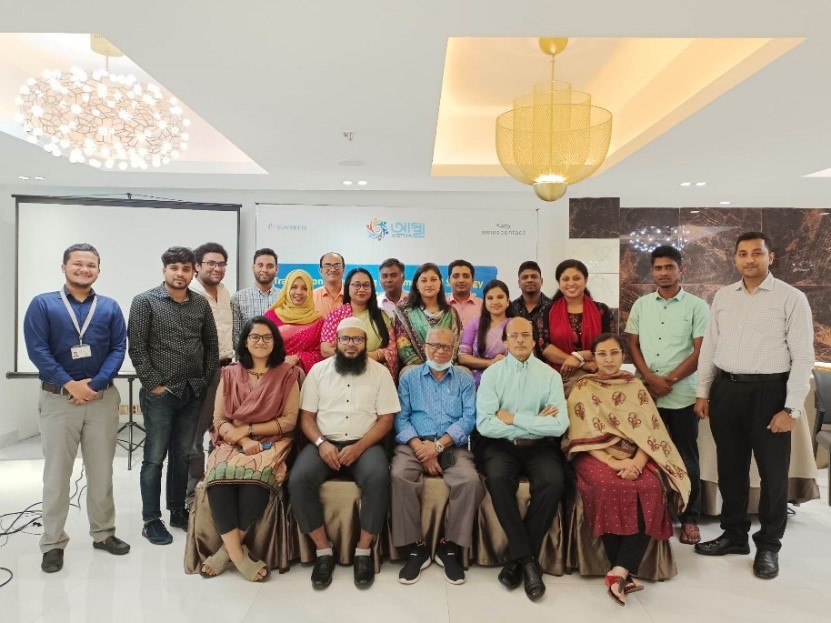 As there is a huge shortage of skilled Community Paramedics in Bangladesh, to ensure health services for rural people, several Community Paramedic Training Institute (CPTI) has been established to create efficient and skilled Community Paramedics. Achieving Sustainability Towards Healthcare Access – ASTHA project aims to facilitate the developing and integrating of Community Paramedic services in rural Bangladesh.
The project focuses on increasing healthcare outreach in rural, and hard to reach areas with special attention to Maternal and Child Health (MCH), Family Planning (FP), and Basic Primary Healthcare Services. Bangladesh Training and Research Foundation (BTRF), a sister concern of BCCP, was assigned by ASTHA Project, Swisscontact Bangladesh to conduct a capacity development training on “Developing Promotional Strategy for Community Paramedic Training Institute (CPTI)”. The assignment was to train the selected Community Paramedic Training Institutes (CPTIs) professionals to develop a comprehensive marketing and promotional strategy to promote Community Paramedic (CP) training. The key objective of the training was to equip the CPTIs with the necessary knowledge and skills to develop and implement an effective promotional campaign to increase the uptake of CP training.
As there is a huge shortage of skilled Community Paramedics in Bangladesh, to ensure health services for rural people, several Community Paramedic Training Institute (CPTI) has been established to create efficient and skilled Community Paramedics. Achieving Sustainability Towards Healthcare Access – ASTHA project aims to facilitate the developing and integrating of Community Paramedic services in rural Bangladesh.
The project focuses on increasing healthcare outreach in rural, and hard to reach areas with special attention to Maternal and Child Health (MCH), Family Planning (FP), and Basic Primary Healthcare Services. Bangladesh Training and Research Foundation (BTRF), a sister concern of BCCP, was assigned by ASTHA Project, Swisscontact Bangladesh to conduct a capacity development training on “Developing Promotional Strategy for Community Paramedic Training Institute (CPTI)”. The assignment was to train the selected Community Paramedic Training Institutes (CPTIs) professionals to develop a comprehensive marketing and promotional strategy to promote Community Paramedic (CP) training. The key objective of the training was to equip the CPTIs with the necessary knowledge and skills to develop and implement an effective promotional campaign to increase the uptake of CP training.
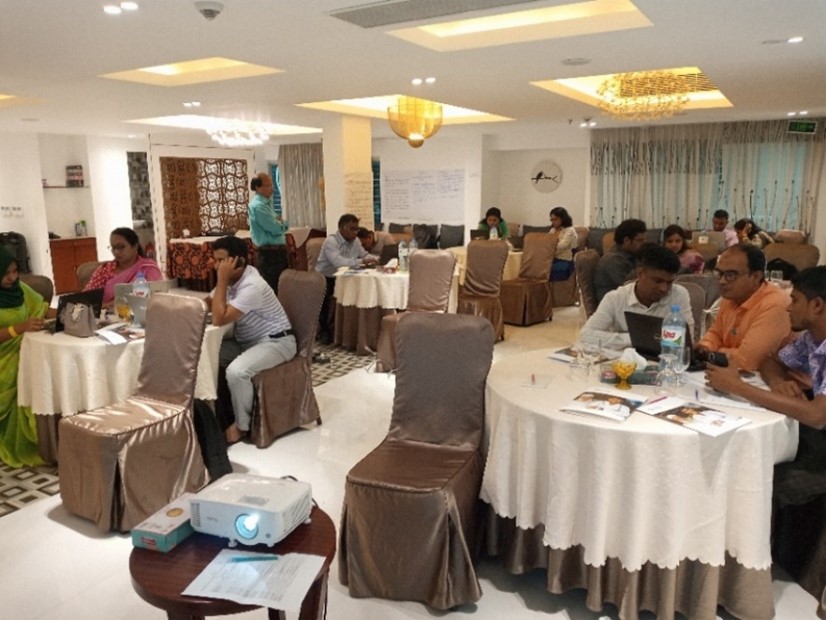 As a part of this assignment, BTRF conducted a training need assessment with the participants, developed the training course contents and training materials, and conducted the 4-day training course on “Developing Promotional Strategy for Community Paramedic Training Institute” at Hotel Bengal Blueberry from May 21 to May 24, 2023.
As a part of this assignment, BTRF conducted a training need assessment with the participants, developed the training course contents and training materials, and conducted the 4-day training course on “Developing Promotional Strategy for Community Paramedic Training Institute” at Hotel Bengal Blueberry from May 21 to May 24, 2023.
Through this training, the participants received technical assistance to develop the draft promotional strategy following a standard framework based on the specific needs of the CPTIs. The training was facilitated by the senior trainers of BTRF.
It is expected that every participant of this training session would be able to incorporate their learning from this training into their respective working environment to achieve the program objective of the CPTIs.
BCCP’s collaboration with ICMH initiated through a Training Needs Assessment (TNA) under the skill building interventions for improved Client-Provider interactions
A collaborative effort has brought the Bangladesh center for Communication Programs (BCCP) and the Institute for Child and Mother Health (ICMH) together to initiate skill building interventions for improved and effective Client-Provider interactions. This intervention will be grounded with an Interpersonal Communication and Counselling (IPC/C) ToT course for the senior officials of ICMH who in-turn will train up their whole cadre of the service providers to enhance their IPC and Counselling skill for better client satisfaction and quality of care.
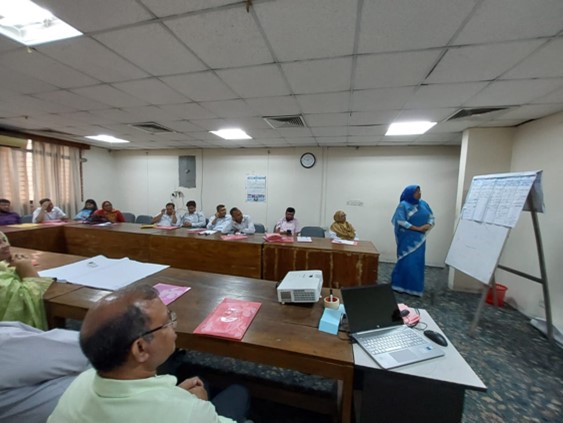 This IPC/C training has been planned to provide under a set of a cascaded model of curriculum. In order to develop such a curriculum focusing the needs and essentials of the targeted trainees, a Training Needs Assessment was planned and have been held on June 08, 2023 at the ICMH training venue with the potential trainers and beneficiaries of this ToT course planned, developed and facilitated by BCCP.
This IPC/C training has been planned to provide under a set of a cascaded model of curriculum. In order to develop such a curriculum focusing the needs and essentials of the targeted trainees, a Training Needs Assessment was planned and have been held on June 08, 2023 at the ICMH training venue with the potential trainers and beneficiaries of this ToT course planned, developed and facilitated by BCCP.
A number of 21 professionals of the institute from the ranks of Professor, Associate Professor, Asstt. Professor along with few management professionals took part in this Training Needs Assessment which went through following methodologies:
- Plenary discussion and presentation
- Brain storming
- Card writing
- Group exercise, and
- Group presentation.
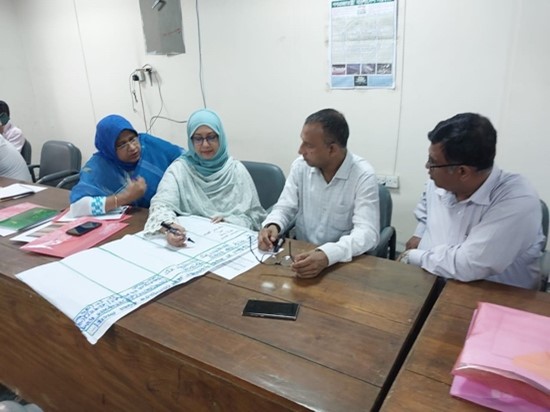 The conduction of the Training Needs Assessment came out with the level, way and critical issues in respect to the Client-Provider interactions in general and Interpersonal Communication and Counselling in particular that takes place in service delivery provisions in respect to the child and mother health. The TNA sessions went on very interactive with the proactive participation of the attendees and the facilitator which helped the process of developing a cascaded model of training curriculum on Interpersonal Communication and Counselling.
The conduction of the Training Needs Assessment came out with the level, way and critical issues in respect to the Client-Provider interactions in general and Interpersonal Communication and Counselling in particular that takes place in service delivery provisions in respect to the child and mother health. The TNA sessions went on very interactive with the proactive participation of the attendees and the facilitator which helped the process of developing a cascaded model of training curriculum on Interpersonal Communication and Counselling.
Observance of World No Tobacco Day-2023
On May 31st, World No Tobacco Day was celebrated all over the world including Bangladesh. In Dhaka, a colourful rally was brought out from the Central Shaheed Minar by different organizations working on tobacco control under the leadership of the National Tobacco Control Cell (NTCC), Ministry of Health and Family Welfare. This year’s World No Tobacco Day theme was "Grow Food, Not Tobacco." The theme will encourage tobacco farmers to shift their focus towards cultivating diverse, healthy, and nutritious food products instead of tobacco. Additionally, the event sought to address the unethical tactics employed by the tobacco industry, which ultimately undermine our humanity.
The rally was attended by distinguished representatives from the government, non-governmental organizations, and academic institutions. Bangladesh Center for Communication Programs (BCCP) and two of its sister concerns- Bangladesh Tobacco Control Research Network (BTCRN) and Leaders in Tobacco Control Alumni Association were pleased to participate in the rally.
At the request of NTCC, BCCP provided technical assistance to develop the WNTD 2023 poster. Thousands of posters were printed and distributed all over the country to observe the day.
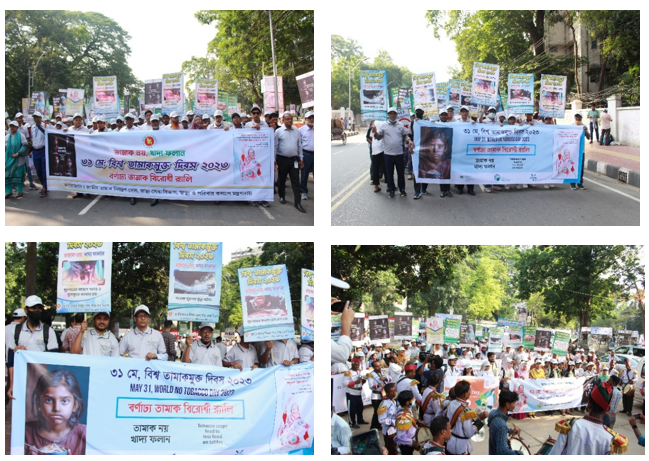
Information & communication technology Trends :

The Cloud Storage- how a jargon has become a daily life reference
Cloud Storage is a mode of computer data storage in which digital data is stored on servers. A third-party supplier who is in charge of hosting, administering, and protecting the data kept on its infrastructure maintains the servers.
 Data can be stored, accessed, and maintained by using cloud storage, and operate their own data centers, moving expenses from a capital expenditure model to operational.
Data can be stored, accessed, and maintained by using cloud storage, and operate their own data centers, moving expenses from a capital expenditure model to operational.
Key Notes:
➤ A device with an internet connection can be used to store and retrieve computer files using cloud storage.
➤ Cloud storage has become more and more popular among people who need more storage space and among companies looking for a reliable off-site data backup option.
➤ Cloud security has grown to be a top priority in order to safeguard data integrity, thwart hacking efforts, and avoid file or identity theft as a result of cloud storage's rising use and popularity.
Top 10 cloud service providers want to strengthen their positions with their core capabilities, plans, and approach towards the market.
From those the largest cloud providers in the world are Amazon Web Services, Google Cloud Platform, and Microsoft Azure.
These companies dominate the cloud computing market and offer a wide range of services to businesses and individuals.
The most popular cloud storage services among these provider platforms are Google Drive from Google Cloud Platform and One Drive from Microsoft Azure.


Storage Space: OneDrive provides a generous amount of free storage space to Microsoft account holders (currently 5 GB). Additionally, subscribers to Microsoft 365 (formerly Office 365) plans receive even more storage, ranging from 1 TB to unlimited storage, depending on the subscription level. This ample storage capacity allows users to store and manage a significant amount of files and data.
OneDrive offers several advantages in terms of data safety and protection against data loss.
Here are some key advantages: Automatic Backup: OneDrive provides automatic backup of your files to the cloud.
File Recovery: OneDrive provides a "Files Restore" file recovery option.

Recycle Bin: Files that have been deleted from OneDrive are sent to the Recycle Bin, where they can be retrieved for up to 30 days. This adds an extra level of security against accidental data deletion or loss.
 Security Measures: OneDrive uses strong security features, such as data encryption in transit and at rest, and data access controls to established standards and laws, to safeguard data.
Multi-Device Syncing: OneDrive synchronizes information between a variety of devices, including PC, smartphone, and tablet. This minimizes the risk of data loss due to device failure or loss by ensuring that always have access to the most recent version of files, irrespective of the device that are using.
Security Measures: OneDrive uses strong security features, such as data encryption in transit and at rest, and data access controls to established standards and laws, to safeguard data.
Multi-Device Syncing: OneDrive synchronizes information between a variety of devices, including PC, smartphone, and tablet. This minimizes the risk of data loss due to device failure or loss by ensuring that always have access to the most recent version of files, irrespective of the device that are using.

In conclusion, cloud storage services have altered the way to manage, store, and access digital information. Examples include One-Drive and Google Drive. These platforms now play a crucial role in our daily lives by offering simple and safe storage options for both individuals and companies.
Accessibility is one of the main benefits of services like One-Drive and Google Drive. Users may effortlessly store and retrieve their files using a range of devices, including PCs, smartphones, and tablets, from any location with an internet connection. Because files can be shared and worked on in real-time from anywhere, this flexibility enables seamless collaboration and productivity.
We could expect that as cloud technology develops, these services will also advance, offering ever more cutting-edge features and functions to satisfy consumers' increasing demands.

The implementation of e-Government Procurement (e-GP) systems has transformed public procurement processes worldwide. Bangladesh, with its commitment to digital transformation, has embraced this change through the Central Procurement Technical Unit (CPTU) under the Implementation Monitoring Evaluation Division (IMED) of the Ministry of Planning. The e-Tendering system, an integral part of the e-GP platform, has ushered in a new era of transparency, efficiency, and accountability in public procurement. This editorial explores the remarkable benefits of e-Tendering and its significant contribution to the development of Bangladesh.
The e-Tendering system is a game-changer, particularly when it comes to ensuring transparency and accountability in public procurement. By moving the entire tendering process online, it reduces the scope for corruption, favoritism, and unethical practices. The digital platform ensures that all stakeholders have access to the same information simultaneously, minimizing information asymmetry. This transparency fosters healthy competition and ensures that tenders are awarded to the most deserving and competent bidders.
The traditional tendering process often suffered from delays, paperwork, and bureaucratic hurdles, resulting in unnecessary time and cost overruns. However, with e-Tendering, these inefficiencies have been significantly reduced. The system allows for swift and streamlined procurement procedures, automating various stages such as bid submission, evaluation, and contract awarding. As a result, the overall procurement timeline has been drastically shortened, saving valuable time and resources for both the government and the bidders.
The introduction of e-Tendering has opened up a broader marketplace for potential bidders. Previously, limited information accessibility and geographical constraints limited competition in public procurement. However, the digital platform has effectively eliminated these barriers. Bidders from across the country can now participate, leveling the playing field and encouraging healthy competition. This increased competition not only drives down costs but also ensures that the best quality goods and services are procured for the benefit of the nation.
With the e-Tendering system, the government has taken a significant step towards promoting sustainability and reducing its environmental footprint. By minimizing the reliance on paper-based processes, e-Tendering helps in conserving precious natural resources and reducing waste generation. The digital platform also enables the efficient tracking and monitoring of procurement activities, reducing the chances of fraudulent practices and promoting responsible procurement practices.
The e-Tendering system, facilitated by the CPTU under the IMED of the Ministry of Planning, has emerged as a cornerstone of Bangladesh's digital transformation journey. Its promotional and awareness activities align perfectly with the efforts of Bangladesh Center for Communication Programs (BCCP) in carrying on effective communication interventions. By harnessing the power of communication, BCCP is playing a pivotal role in creating awareness and educating stakeholders about the benefits of e-Tendering, ensuring its widespread adoption and maximizing its potential impact on public procurement in Bangladesh.
To ensure the successful implementation and long-term sustainability of e-Tendering, BCCP is raising awareness about the e-Tendering system, educating government officials, bidders, and the general public about its advantages, and addressing any concerns or misconceptions that may arise during the transition. By fostering a culture of communication and knowledge sharing, BCCP is delighted to drive the continued success and effectiveness of e-Tendering in Bangladesh as assigned by CPTU under the IMED of the Ministry of Planning, Bangladesh.


World Bank helps Bangladesh transform public procurement into a sustainable online system
The World Bank has helped the Bangladesh government transform its public procurement system into a more efficient online process. The e-Government Procurement (e-GP) system has brought significant financial savings and socio-economic benefits and improved the governance. The technology-driven public procurement read more...

How e-procurement helped Bangladesh save $1.4bn
The procurement lead time for all e-GP tenders has fallen from 100 days to 53 days in 2023, according to the World Bank, which said it had helped fund and implement the system. Use of the system has led to about 7% savings in procurement costs compared with using manual paper-based procurement. The government estimates the system has saved $1.4bn in 2023 compared with paper-based tendering read more...

New record in e-GP tender opening
A total of 2,230 tenders were opened, according to Central Procurement Technical Unit of the Implementation Monitoring and Evaluation Division (IMED). The IMED, a division under the planning ministry, introduced the e-GP system in 2011 as a part of the government's efforts to digitalise all public service delivery read more...

NDB delegation lauds Bangladesh's public procurement system
The public procurement system in Bangladesh is very advanced," Hua Xu, a senior procurement professional of NDB, observed at the meeting at CPTU Conference Room in Dhaka on Sunday. He Tian, project team leader of the Public Sector Department of NDB, led the delegation in the meeting, chaired by CPTU Director read more... ...

The Rohingya’s Plight in Bangladesh Is Not Sustainable
Given the many other crises in the world, the plight of the Rohingya is almost forgotten. The United States is the largest aid donor but the world is beset by many new conflicts and humanitarian crises. A high-level visit next month to Washington would be a time to engage Bangladesh on some short-term and perhaps longer-term steps read more...

Lives of the Rohingya children in limbo: Childhood, education, and children's rights in refugee camps in Bangladesh
The Rohingyas, an ethnic minority of Myanmar, have been denied human rights, including nationality. For decades, they have suffered from brutal oppression, discrimination, violence, torture, unjust prosecution, murder, and extreme poverty. Hostile situations in Rakhine State have forced the Rohingyas to flee from their homes and seek refuge in neighboring Bangladesh and other countries, including India read more... ...

Dwindling aid leaves Rohingya women exposed to rising violence in Bangladesh
Kidnappings, shootings, and the threat of sexual violence are forcing Rohingya refugee women to live in fear, often preventing them from leaving their homes to access vital services, according to refugee women, aid workers, and camp officials in Bangladesh. Women and girls make up 52% of the more than 900,000 Rohingya refugees from Myanmar who live in the camps in Bangladesh’s Cox’s Bazar district – the world’s largest refugee settlement read more...

Why Ukraine is moving the needle on old debates about humanitarian neutrality
If you are neutral in situations of injustice, you have chosen the side of the oppressor, the adage goes. Yet neutrality is one of the core principles underpinning traditional humanitarianism – a precondition, some believe, to navigating aid access amid conflict and warring parties. Neutrality’s effectiveness, let alone its ethics, repeatedly come under question in conflict. Ukraine is the latest crisis to challenge humanitarian orthodoxy read more...

It Shouldn’t Take a Cyclone for Us To Care About The Rohingya
As Cyclone Mocha made landfall in Bangladesh and Myanmar on 14 May, local people and the humanitarian community nervously held their breath. Not only was it a category five-level cyclone—the highest alert level—its path was predicted to go straight through the world’s largest refugee camp in Cox's Bazar; a camp housing one million Rohingya refugees, who have fled multiple bouts of violence in Myanmar’s Rakhine state. In anticipation of a crisis, aid agencies prepared, by pre-positioning essential supplies such as food, water purification tablets read more...

Reflecting on Rana Plaza: The Evolution of Corporate Engagement on Human Rights in Supply Chains since the 2013 disaster
Marti Flacks: Good morning. Welcome to the Center for Strategic and International Studies and today’s event, reflecting on Rana Plaza, the evolution of corporate engagement on human rights in supply chains since the 2013 disaster. My name is Marti Flacks. I’m the director of the Human Rights Initiative and Khosravi chair in principled internationalism read more...

UNESCO unveils new AI roadmap for classrooms
The ministers exchanged policy approaches and plans while considering the agency’s new roadmap on education and generative AI, which can create data and content based on existing algorithms, but can also make alarming factual errors, just like humans. “Generative AI opens new horizons and challenges for education, but we urgently need to take action to ensure that new AI technologies are integrated into education on our terms,” said Stefania Giannini, UNESCO’s Assistant Director-General for Education. “It is our duty to prioritize safety read more...

Untested AI-based tools could harm patients, WHO warns
Cautionary measures normally applied to any new technology are not being exercised consistently with regard to large language model (LLM) tools, which use AI for crunching data, creating content, and answering questions, the World Health Organization (WHO) warned. “Precipitous adoption of untested systems could lead to errors by healthcare workers, cause harm to patients, erode trust in AI, and thereby undermine or delay the potential long-term benefits and uses of such technologies around the world,” the agency said read more...

WHO calls for safe and ethical AI for health
The World Health Organization (WHO) is calling for caution to be exercised in using artificial intelligence (AI) generated large language model tools (LLMs) to protect and promote human well-being, human safety, and autonomy, and preserve public health. LLMs include some of the most rapidly expanding platforms such as ChatGPT, Bard, Bert and many others that imitate understanding, processing, and producing human communication read more...

Leaders, Sharing Your Own Mental Health Story Can Help You Become a Better Ally
More than a decade ago when I had to take a leave of absence due to generalized anxiety disorder and depression, I thought my career was over. I was struggling — drowning in shame, self-stigma, and fear of professional repercussions as I did my best to hide what was happening. What would have given me hope was knowing other leaders had successfully navigated mental health challenges read more...

First Person: Why indigenous peoples can help save the planet
On Mother Earth Day, marked annually on 22 April, Naw Ei Ei Min, a member of Myanmar’s indigenous Karen people, explains why indigenous peoples have an important role to play, in protecting the environment and addressing the climate crisis. “For indigenous peoples, the land, the forest, water, is life. We depend on the natural environment, and we care for our surroundings. Managing natural resources is a strong part of our way of life read more...

Human, economic, environmental toll of climate change on the rise: WMO
The organization says its report, released ahead of this year’s Mother Earth Day, echoes UN Secretary-General António Guterres’ call for “deeper, faster emissions cuts to limit global temperature rise to 1.5 degree Celsius”, as well as “massively scaled-up investments in adaptation and resilience, particularly for the most vulnerable countries and communities who have done the least to cause the crisis” read more...

Current climate policies ‘a death sentence’ for the world, warns Guterres
If governments continue with the same environmental policies currently in place, the world will become 2.8°C hotter by the end of the century, which would be “a death sentence”, warned the UN chief on Thursday. Antonio Guterres was addressing via videolink, the fourth meeting of the Major Economies Forum, convened by the United States President Joe Biden, which is designed to galvanize efforts to keep the global temperature rise of 1.5°C above pre-industrial levels read more...

Extreme weather caused two million deaths, cost $4 trillion over last 50 years
According to WMO, weather, climate and water-related hazards caused close to 12,000 disasters between 1970 and 2021. Developing countries were hit hardest, seeing nine in 10 deaths and 60 per cent of economic losses from climate shocks and extreme weather. Tweet URL WMO said that Least Developed Countries and Small Island Developing States suffered a “disproportionately” high cost in relation to the size of their economies read more...

WHO issues urgent call for global climate action to create resilient and sustainable health systems
Today, at the World Health Organization (WHO), panelists made an impassioned plea for urgent climate action as it hosted a Strategic Roundtable on the Role of the Health Communities in Climate Action: taking stock and moving forward at the World Health Assembly. “The most pressing reasons for urgent climate action are the impacts not in the future, but right now, on health” said Dr Tedros Adhanom Ghebreyesus, WHO Director-General, as he opened today’s Strategic Roundtable read more...

Six dos and six don’ts for tackling the climate emergency
We need a radical overhaul in record time to stand a chance of meeting the needs of people on the front lines of the climate emergency. We’re starting this journey decades late and – critically – not taking lessons from other recent transformations in the humanitarian system. The recent annual trade fair known as Humanitarian Networks and Partnerships Week is always a good time for a temperature check on trends and developments in the sector. Geneva’s conference rooms were brimming with passionate people and energetic discussion read more...

Health systems show first major signs of post-COVID-19 recovery
Among the 139 countries responding to the survey, WHO said continued disruptions persist in almost one quarter of services. In 84 countries where trend analysis is possible, the percentage of disrupted services declined on average from 56 per cent in July to September 2020 to 23 per cent in November 2022, to January 2023 read more...

World must be ready to respond to next pandemic: WHO chief
“The threat of another variant emerging that causes new surges of disease and death remains, and the threat of another pathogen emerging with even deadlier potential remains.” Tweet URL Furthermore, in the face of overlapping and converging crises, “pandemics are far from the only threat we face”, he added, underscoring the need for effective global mechanisms that address and respond to emergencies of all kinds read more...

Bangladesh eliminates lymphatic filariasis as a public health problem
In a boost to efforts to end neglected tropical diseases in WHO South-East Asia Region, Bangladesh has eliminated lymphatic filariasis, a disease that cripples and has significant social and economic impact on the affected communities. “Bangladesh’s achievement is commendable and follows strong political read more...

New survey results show health systems starting to recover from pandemic
After three years of the COVID-19 pandemic, health systems in countries have started showing the first major signs of health system recovery, according to the WHO interim report on the “Fourth round of the global pulse survey on continuity of essential health services during the COVID-19 pandemic: November 2022–January 2023”. By early 2023, countries reported experiencing reduced disruptions in the delivery of routine health services, but highlighted the need to invest in recovery and stronger resilience for the future read more...

Smallpox Eradication: A Model for Global Cooperation
In order to explore the specific methods and approaches that can advance U.S.-China collaboration on matters of shared concern, the project Advancing Collaboration in an Era of Strategic Competition, a joint initiative between CSIS and the Brookings Institution, is examining a series of historical case studies that demonstrate past instances of cooperation among geostrategic rivals read more...

Give us road crash data before publishing, BRTA asks road safety orgs
The government has asked the non-government organisations working on road safety to inform the authorities concerned before releasing data on road crashes and casualties. Bangladesh Road Transport Authority (BRTA) on Tuesday sent a letter to four non-government organisations in this regard. The Daily Star obtained a copy of the letter signed by Mahbub-E-Rabbani, director (road safety) of BRTA read more...

Biggest Road Safety Project: Concern rising over fate of WB fund
The World Bank in March last year approved a loan for the biggest road safety project in Bangladesh. The loan contract with Bangladesh authorities has to be signed within one and a half years of the approval, or else, the loan would be cancelled, said officials. One year has already gone by, but the project has not been approved yet, a pre-condition for signing the loan deal, rising concern over the fate of the project's funding, they said read more...

Stop tobacco farming, grow food instead, says WHO
Ahead of World No Tobacco Day on Wednesday 31 May, WHO deplored that 3.2 million hectares of fertile land across 124 countries are being used to grow deadly tobacco – even in places where people are starving. Tweet URL WHO Director-General Tedros Adhanom Ghebreyesus said that governments across the world “spend millions supporting tobacco farms”, and that choosing to grow food instead of tobacco would allow the world to “prioritize health, preserve ecosystems, and strengthen food security for all” read more...

WHO and tobacco control partners urge countries not to partner or work with the tobacco industry
WHO is concerned with continued attempts by the tobacco industry and their surrogates to further its interests to influence scientific research, public perception, policy making, and the media; all aimed to ensure proliferation and sale of nicotine and tobacco products. The tobacco industry continues to amplify misinformation in the media, including the recent egregious attacks on tobacco control organizations[1]. The tobacco industry is the only one that stands to benefit by undermining tobacco control organizations read more...

Why the Industry Loves—and Protects—Tobacco Flavors
The dangers of flavored tobacco are clear: It’s appealing to young people, makes it easier to start using tobacco and harder to quit. In other words, tobacco flavors are one of the most effective tools the tobacco industry has to hook the next generation. That’s why the industry fights flavor bans or finds ways to work around them. If flavors aren’t there to cover up the unpleasant taste, smell and sensation of tobacco for young or new smokers, fewer people will become lifelong tobacco users. That means less strain on health systems and economies read more...

Flavored Tobacco: 3 Ways It Hooks Young People
Around the world, an estimated 38 million 13-15-year-olds use tobacco products. Let that sink in for a minute. That means at least 38 million young people—equivalent to the entire population of Canada—face two difficult challenges: quitting tobacco, or dealing with a lifelong addiction to a product that will hinder their development, strain their finances and ultimately kill up to half of them read more...

In Bangladesh, Single Sticks Fuel Multiple Problems
Let’s start with the (very) good news. Between 2009 and 2017, overall rates of tobacco use in Bangladesh dropped significantly. Among people aged 15 and older, tobacco use declined from about 43% to about 35%. In a world where tobacco use and quit rates tend to vary between wealthier people and poorer people, this reduction in tobacco use was unique: It occurred across all socioeconomic groups, according to a Tobacconomics report that summarizes several smoking-prevalence studies in Bangladesh read more...

Mitigating Risk and Capturing Opportunity: The Future of Alternative Proteins
Food security is a cornerstone of human development, economic development, and national security. But the production of food can itself confer and exacerbate certain global risks—including competition for scarce resources, pandemic emergence, and climate change—that contribute to food insecurity. The world 30 years from now will not only be larger—the global population is expected to approach 10 billion by 2050—but wealthier read more...

Dangerously Hungry: The Link between Food Insecurity and Conflict
Economist Paul Collier once wrote that “war is development in reverse.” That conflict inevitably produces poverty and hunger is a theory that has been tested—and proven true—in every major clash across human history. It is believed, for example, that more people died of starvation and starvation-related disease than from combat during the Second World War read more...

BCCP PROMOTIONAL VIDEO

